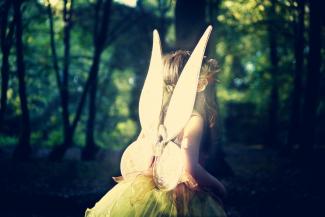
Do the preparation task first. Then read the text and do the exercises.
Preparation
(1) Fairies today are the stuff of children's stories, little magical people with wings, often shining with light. Typically pretty and female, like Tinkerbell in Peter Pan, they usually use their magic to do small things and are mostly friendly to humans.
(2) We owe many of our modern ideas about fairies to Shakespeare and stories from the 18th and 19th centuries. Although we can see the origins of fairies as far back as the Ancient Greeks, we can see similar creatures in many cultures. The earliest fairy-like creatures can be found in the Greek idea that trees and rivers had spirits called dryads and nymphs. Some people think these creatures were originally the gods of earlier, pagan religions that worshipped nature. They were replaced by the Greek and Roman gods, and then later by the Christian God, and became smaller, less powerful figures as they lost importance.
(3) Another explanation suggests the origin of fairies is a memory of real people, not spirits. So, for example, when tribes with metal weapons invaded land where people only used stone weapons, some of the people escaped and hid in forests and caves. Further support for this idea is that fairies were thought to be afraid of iron and could not touch it. Living outside of society, the hiding people probably stole food and attacked villages. This might explain why fairies were often described as playing tricks on humans. Hundreds of years ago, people actually believed that fairies stole new babies and replaced them with a 'changeling' – a fairy baby – or that they took new mothers and made them feed fairy babies with their milk.
(4) While most people no longer believe in fairies, only a hundred years ago some people were very willing to think they might exist. In 1917, 16-year-old Elsie Wright took two photos of her cousin, nine-year-old Frances Griffiths, sitting with fairies. Some photography experts thought they were fake, while others weren't sure. But Arthur Conan Doyle, the writer of the Sherlock Holmes detective stories, believed they were real. He published the original pictures, and three more the girls took for him, in a magazine called The Strand, in 1920. The girls only admitted the photos were fake years later in 1983, created using pictures of dancers that Elsie copied from a book.
Discussion
Language level
- Log in or register to post comments
- Log in or register to post comments
- Log in or register to post comments
- Log in or register to post comments
- Log in or register to post comments
- Log in or register to post comments
- Log in or register to post comments
- Log in or register to post comments
- Log in or register to post comments
- Log in or register to post comments



